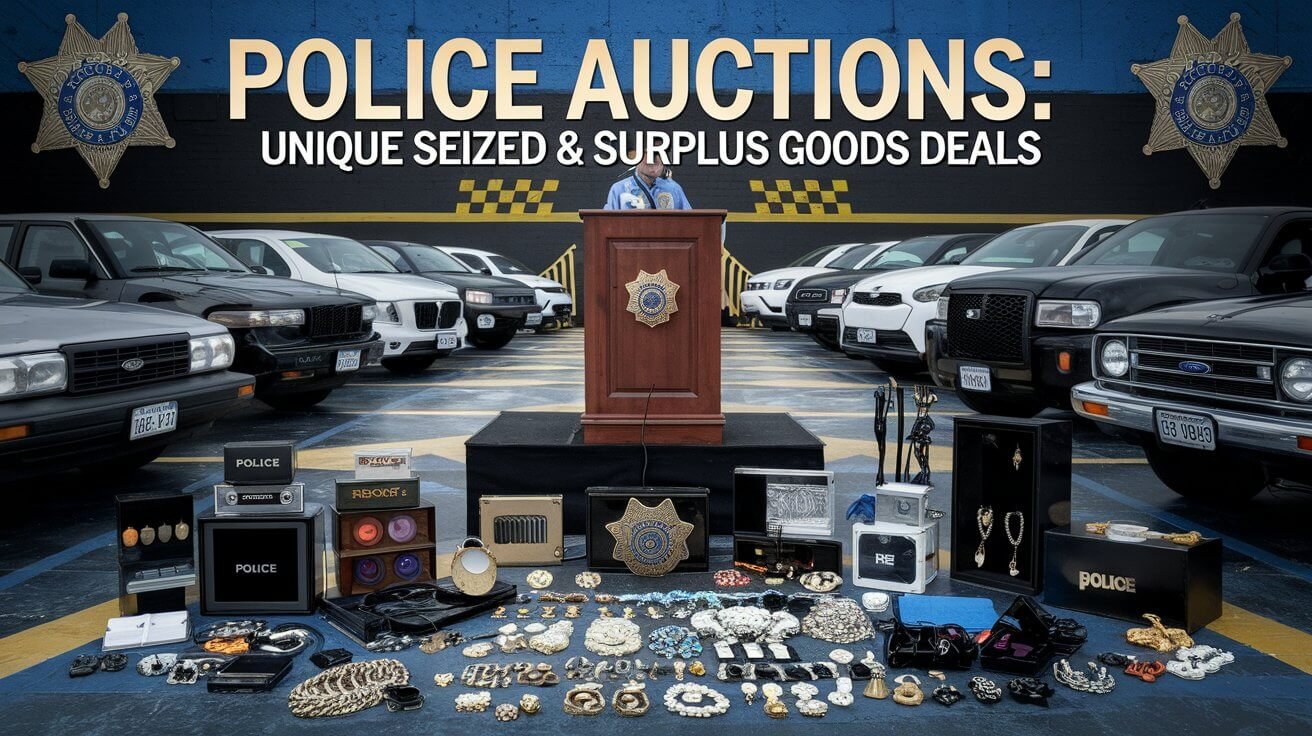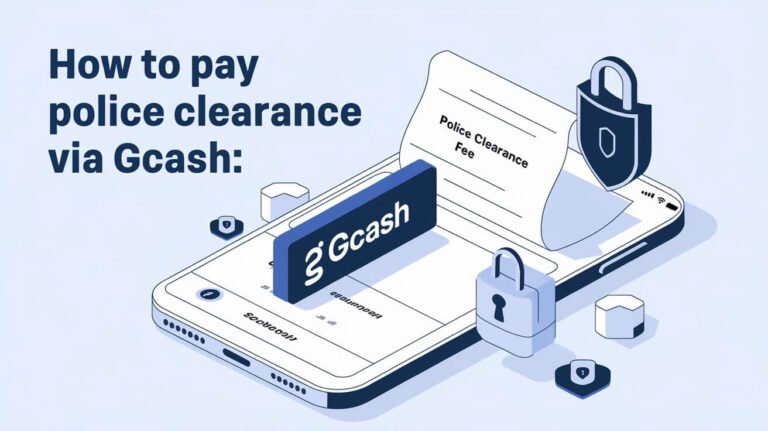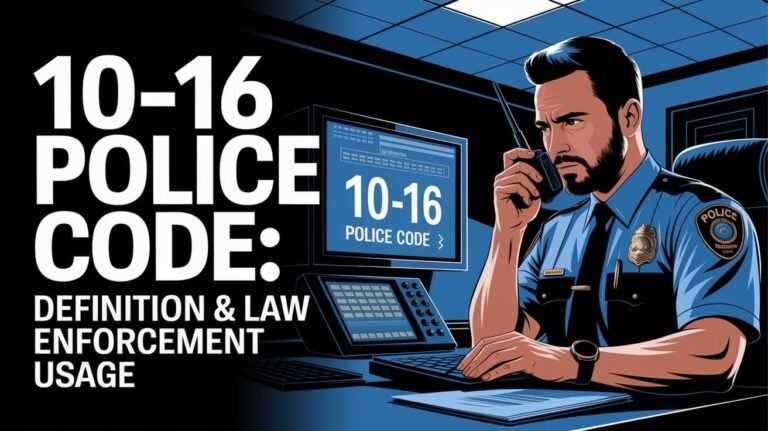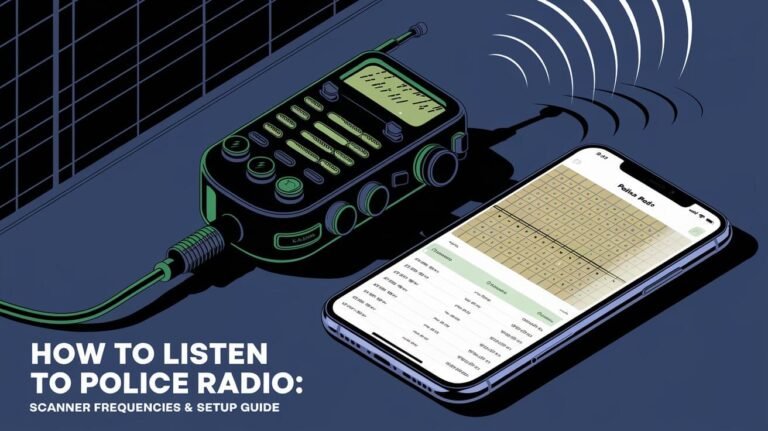Police Auctions: Unique Seized & Surplus Goods Deals

Police auctions let you buy quality items at lower prices. They include seized property. For example, the City of Long Beach Lien Sales Auction has many items, like vehicles. It’s open to everyone, with no limit on how many can attend.
The City of Long Beach Lien Sales Auction happens every other Tuesday. It’s at 3111 E. Willow Street, Long Beach, California. This is a great place to see property sales happen.
To join police auctions, you must be 18 or older. You also need a valid driver’s license or state ID. The winning bidder pays a $35 fee, but it doesn’t add to the auction price.
The next auction is on 02/11/2025. It’s important to understand police auctions. You should know the rules, like the “AS IS, WHERE IS” policy. They also accept cash, Visa, MasterCard, Discover Card, or U.S.-issued debit cards.
What Makes Police Auctions Different from Regular Sales
Police auctions let buyers snag items at lower prices. These items often come from law enforcement actions, like seizures. It’s important for buyers to know the legal aspects of these sales. This knowledge affects the buying process and who owns the items.
Origins of Auctioned Items
The City of Chicago shares details on surplus, vehicles, and auctions. This helps understand where auctioned items come from. Vehicles at these auctions include cars, trucks, motorcycles, and boats. You won’t find such a variety elsewhere.
Price Advantages for Buyers
Police auctions give buyers price advantages. Items are sold at lower prices. For example, vehicles are 20-50% cheaper than at dealerships. This makes police auctions a great place to find deals.
Some key benefits of police auctions include:
- Discounted prices
- Diverse inventory
- No reserve price
- Opportunity to purchase items below market value
Types of Items Available at Police Auctions
Police auctions have a wide variety of items. You can find everything from electronics and vehicles to jewelry and artwork. This variety often means less competition, as many people don’t know about these auctions.
Items like vehicles, jewelry, designer clothes, tools, and cameras are common. You can also find surplus equipment and collectibles. Vintage police badges, police-themed comic books, and tin police motorcycles are highly sought after by collectors.
Online listings for police auctions include photos. This helps buyers see the quality and condition of items. Auctions can be canceled if the original owner claims their item back. This shows the constant flow of goods. With so many items available, buyers can find unique and valuable items at lower prices.
- Vehicles, including cars, trucks, and motorcycles
- Jewelry, including gold, silver, and precious stones
- Electronics, including laptops, tablets, and smartphones
- Surplus equipment, including tools and machinery
- Collectible items, including vintage police badges and police-themed comic books
Where to Find Police Auctions Near You
Finding police auctions can be tricky. But, with the right tools, you can discover upcoming sales and what’s up for grabs. Start by searching for auction locations in your area. You can find them on online platforms, local department sites, and government websites.
Cities like Long Beach, California, and Chicago, Illinois, make it easier. They list surplus items and auctions online. This helps you keep track of auctions and what’s available.
Online Resources
Online auction sites, like Property Room, have a wide variety of items. You can also check local department and government websites for auction info in your area.
Local Listings and Government Websites
Local listings and government sites are great for auction details. They list dates, times, and places. Regularly checking these can help you stay informed and plan your bids.
It’s important to know the auction rules, including any fees or requirements. With the right info, you can find auctions near you and make the most of them.
Registration and Documentation Requirements
Before you can join a police auction, you need to know what’s required. You must sign up with the auction site or the police department. You’ll need to show your ID and proof of where you live. For example, the Wheaton Police Department has these rules on the Property Room website.
Signing up means giving out your personal and contact info, plus how you plan to pay. You might also need to show a driver’s license or state ID to prove who you are. The rules can change based on what’s being auctioned off, like cars or property.
Here are some common things you might need for police auctions: * ID and proof of where you live * How you plan to pay * If it’s a car, you might need the registration and title * Proof of insurance, if it’s needed * A bill of sale or other proof of purchase
It’s important to check the specific rules for each auction. For instance, the California Department of Motor Vehicles has special rules for cars sold by the government. They need a Certificate of Release (Standard Form 97) for cars, and mark non-compliant ones as “NOT FOR HIGHWAY USE.”
| Document | Description |
|---|---|
| Application for Title or Registration (REG 343) | Includes labor costs in the total cost information |
| REG 31 form | Required for inspection of previously junked vehicles by authorized DMV employees or CHP |
| Certificate of Release (Standard Form 97) | Issued for vehicles sold by government agencies, with non-compliant vehicles stamped “NOT FOR HIGHWAY USE” |
Bidding Strategies That Work
Having a good strategy is key when bidding at police auctions. Doing research before the auction is a must. This means checking out items, looking at past auction results, and finding out what similar items are worth. The Property Room website is a great place to do this research and set your price limits.
Understanding who else is bidding is also important. By watching how others bid and knowing what items are in demand, you can make better choices. Always decide how much you’re willing to spend, including any extra costs like taxes and fees.
Effective Bidding Techniques
- Use proxy bids to set a maximum bid upfront and avoid excessive bidding wars
- Research the market value of items using resources like Kelley Blue Book and Carfax
- Observe bidding patterns to gain insights and place bids strategically
Using these strategies, you can do better at police auctions. Always stay informed, set realistic prices, and bid smartly. This will help you get the most out of your bidding experience.
Payment Methods and Collection Procedures
When you join a police auction, knowing how to pay and collect your items is key. The City of Chicago explains these steps for surplus, vehicles, and auctions. Buyers must use accepted payment methods like credit cards or cash after winning.
For police auctions, there are rules for picking up your items. You need to do this within a set time frame. This avoids extra costs like storage fees. The rules help make the transaction safe and smooth for everyone involved.
Accepted Forms of Payment
Police auctions accept cash, debit cards, and credit cards. But, some payment types come with a convenience fee. It’s important to know which payments are accepted before you start. This ensures a smooth payment process.
Item Pickup Protocols
There are rules for picking up your items after an auction. You must do this within a certain time or face extra costs. The rules are in place to make the process efficient and safe for everyone.
| Payment Method | Convenience Fee | Minimum Fee |
|---|---|---|
| Cash | No fee | N/A |
| Credit Card | 3% | $2.50 |
| Debit Card | 3% | $2.50 |
Understanding how to pay and collect items at police auctions is important. The rules are set to make the process easy and secure. They guide you on how to pay and pick up your items.
Risk Management at Property Sales
When you buy at police auctions, knowing the risks is key. It’s important to understand the sale terms, including any warranties. The Wheaton Police Department shares risk management tips on the Property Room website.
To handle risks, do your homework on the properties. Learn about the auction process, including the minimum bid. This bid covers all taxes, penalties, and interest. Remember, properties are sold “as is” with no warranties.
Some important things to think about for risk management include:
- Understanding the terms and conditions of the sale
- Researching the properties thoroughly
- Knowing the minimum bid and any additional costs
- Being aware of any possible liabilities or risks with the property
Knowing the risks in police auction risk management and property sales, you can make smart choices. It’s important to be careful and evaluate everything before bidding.
| Property Type | Minimum Bid | Auction Date |
|---|---|---|
| Foreclosed properties | Delinquent taxes, penalties, and interest | September and October 2024 |
| Vacant lots | Delinquent taxes, penalties, and interest | September and October 2024 |
Common Myths About Police Auctions Debunked
Police auctions are often misunderstood, leading to myths about prices, quality, and legal rights. It’s key to know the truth to make smart choices. One big myth is that you can buy things for much less than they’re worth.
But, the truth is, prices are lower, but not always as cheap as thought. People also think items are of poor quality or damaged. Yet, many items are in great shape, needing only small fixes.
Debunking Price Misconceptions
- Prices can be lower, but not always significantly so
- Quality of items varies, with some in good condition and others requiring repairs
- Research and inspection are key to smart bidding
Understanding Quality Expectations
Another myth is that all items at police auctions are low quality. While some might be damaged, others are in excellent shape. It’s vital to research and inspect items before bidding.
This way, you can ensure you’re getting a fair deal. By understanding these myths, buyers can find quality items at good prices. This helps manage their expectations well.
Conclusion
Police auctions are a treasure trove for those who know how to find them. They offer a chance to buy seized property and surplus equipment at great prices. By understanding where these items come from and the legal rules, buyers can find amazing deals.
The Property Room website is a great place to start. It lets buyers see a wide range of items from law enforcement agencies. Whether you’re looking for tools, electronics, or vehicles, police auctions can be a goldmine.
To succeed in police auctions, follow the tips in this article. This includes knowing how to register, bid, and pay. The secret to doing well is to stay alert, be careful, and enjoy the search.
Answered Questions
What makes police auctions different from regular sales?
Police auctions are unique because the items come from law enforcement activities. This includes seizures or confiscations. Buyers get great deals, as items are sold at lower prices.
What types of items are available at police auctions?
You can find a wide variety of items at police auctions. This includes electronics, vehicles, jewelry, and artwork. It’s a treasure trove for bargain hunters.
How can I find police auctions near me?
Finding police auctions is easy. You can use online platforms, check local department listings, or visit government websites.
What are the registration and documentation requirements for participating in a police auction?
To participate, you need to register. You’ll need to provide identification and proof of address.
What bidding strategies can improve my chances of success at a police auction?
To win at police auctions, you need a good strategy. Research beforehand, set a budget, and know the competition. These steps can boost your chances.
What payment methods and collection procedures are typically involved in police auctions?
Payment is usually by credit card or cash. You’ll need to follow the pickup rules and consider any storage fees.
What are the risks involved in participating in police auctions?
There are risks, like buying items with unknown histories. It’s important to know the sale terms and any warranties.
What are some common myths about police auctions that need to be debunked?
Many people think police auctions are too expensive or low-quality. But, the truth is different. Understanding these myths can help you make better choices.






